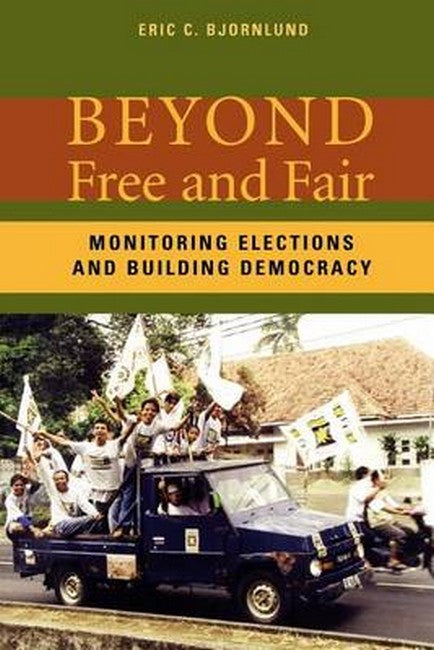List of TablesForeword, by Lee H. HamiltonAcknowledgmentsList of Acronyms and AbbreviationsPart I: Democracy Promotion, Elections, and Election Monitoring1. The Emergence of Election MonitoringDemocracy Promotion and Election MonitoringWhy Study Election Monitoring and Democracy Promotion?Flaws in Current International PracticePlan of the Book2. The Expansion of Democracy and Democracy PromotionThe Emergence of Democracy Assistance in the United StatesBeyond the United States3. Elections and Election MonitoringThe Growing Importance of Elections in Democratization and International RelationsTypes of ElectionsThe Authority of Election ObserversTypes of Election MonitoringThe Extent of Election MonitoringToward Universal NormsPart II: International Election Monitoring4. From Nongovernmental to Intergovernmental Organizations: Actors in International Election MonitoringThe United Nations and ElectionsOther Multilateral OrganizationsU.S. Democracy Organizations5. Jimmy Carter and the Popularization of InternationalElection ObservationThe Carter Center Discovers Election MonitoringPanama: A New Potential UnfurledNicaragua: Carter Invents ""Election Mediation""Carter's Election Monitoring Comes of AgeZambia: Bringing Election Mediation and Parallel Counts beyond Latin AmericaGuyana: Too Much Focus on PVTs?Institutionalizing Election Monitoring and Democracy Promotion at the Carter Center6. Toward ""Free and Fair"" Elections?Sources of Evaluation StandardsThe ""Free and Fair"" StandardStandards in ContextPreconditions to ObservationJudging Elections7. The Scope and Methodology of International Election ObservationStandards of Conduct for ObserversThe Scope and Methodology of ObservationFinding Facts and Making Assessments: Checklists and Standards of ProofThe Coordination of International Election ObserversCoordinating International Observers for the 1996 Palestinian ElectionsDeveloping More Effective Monitoring8. Cambodia: Challenges to International Election ObservationElections and Democratization in CambodiaElections as PanaceaSplits within the International CommunityPreelection Monitoring and Preelection ProblemsThe Interests and Agendas of ObserversPostelection Assessments and Preelection FlawsStrains in the Bipartisan American Approach to Cambodian DemocracyPostelection MonitoringThe 2002 Local Elections: ""Déja Vu All Over Again""9. Host-Government Manipulation of Observers: Elections in ZimbabweRefusing or Manipulating International ObserversRestricting Observers to Zimbabwe's Elections in 2000Observing Zimbabwe's Presidential Election in 2002Manipulating ObserversPart III: Domestic Election Monitoring10. The Origins of Domestic Election Monitoring: NAMFREL and Its SuccessorsThe Invention of Nonpartisan Domestic Election Monitoring in the PhilippinesSharing the NAMFREL IdeaDomestic Election Monitoring Consolidates Its RoleDomestic Monitoring Meets Resistance11. Domestic Election Monitoring as an End and a MeansActivities of EMOs during Elections: Approaches and IssuesCoordination between International and Domestic ObserversElections and Election Monitoring as Ends or MeansToward More Effective Support for Nonpartisan Domestic Political Engagement12. Foreign Support for Domestic Election Monitoring in Indonesia: Missed Opportunities and Unintended ConsequencesBefore the Transition: KIPP and the Precedent for Independent Monitoring in IndonesiaPlanning for the 1999 Elections: University-Based Monitoring and MoreThe Performance of Principal EMOsUnintended Consequences of Foreign Funding and AdviceIneffective Coordination among International Organizations and DonorsPoor Advice from International Organizations and DonorsCollaboration between International and Domestic ObserversCalibrating International Assessments in Response to Domestic Concerns13. Verifying the Vote Count: Quick Counts, Parallel Tabulations, and Exit Polls in Macedonia and IndonesiaQuick Counts and PVTsStatistically Based and Comprehensive TabulationsLimitations of Exit Polls in Transitional or Postconflict Elections: The Experience of MacedoniaMonitoring the Vote Count in Indonesia: Too Much of a Good ThingChoosing Appropriate ToolsPart IV: Toward More Meaningful International Election Monitoring14. Toward More Meaningful International Election MonitoringImproving the Methodologies and Professionalism of International Election ObserversImproving International Support for Nonpartisan Domestic MonitoringToward Best PracticesAppendix: Elections and Election Monitoring in Newly Democratic and Semiauthoritarian CountriesNotesIndex

